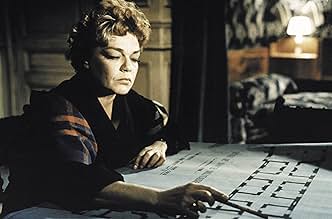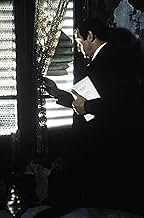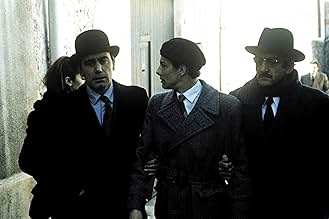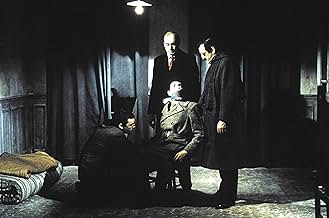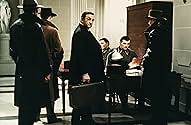Francia, 1942. Philippe Gerbier è un leader della resistenza francese. Attraverso i suoi occhi vediamo la resistenza con gli intrighi e lo spionaggio, la costante minaccia di essere catturat... Leggi tuttoFrancia, 1942. Philippe Gerbier è un leader della resistenza francese. Attraverso i suoi occhi vediamo la resistenza con gli intrighi e lo spionaggio, la costante minaccia di essere catturati dai tedeschi e le decisioni difficili.Francia, 1942. Philippe Gerbier è un leader della resistenza francese. Attraverso i suoi occhi vediamo la resistenza con gli intrighi e lo spionaggio, la costante minaccia di essere catturati dai tedeschi e le decisioni difficili.
- Regia
- Sceneggiatura
- Star
- Premi
- 4 vittorie e 1 candidatura in totale
Recensioni in evidenza
Filmed in a cold, documentary-like style, the "Shadow Army" tells the intertwining stories of several members of the French resistance. The movie defies any sort of simple categorization. It is a thriller without being thrilling. It is a spy story without a single gadget. It portrays the tedium of the task without being boring. Finally, it tells a story of heroic courage without the benefit of a single hero. That last point isn't immediately evident and you are free to disagree, of course, but heroes (as defined in the usual movie terms) are hard to come by in this story.
A popular adage goes; one person's terrorist is another person's freedom fighter. This movie serves up proof to that lie. There are true freedom fighters that will never be labeled "terrorist" and you will meet them during the course of this film. The movie makes clear that they, and the ones around them, paid a high price in pursuit of freedom. Not just in life and limb, but in moral conviction. As the movie unfolds, I found myself asking, is this action justified? The answer, of course, is that it most certainly is. The better question is would I, or anyone I know, have the courage to do what had to be done.
The technical aspects of the film are all first rate even though a bit below the best of European cinema at the time. (In some ways, the lack of high definition color and sets give it a feel much more in keeping with the time it portrays.) The actors disappear into their roles and there is not a star-turn to be found.
According to the announcement made before the screening I attended, it is being released in the United States on May 12, 2006, just before the summer blockbuster crush. Why that date and why now, almost 30 years after it was made, I do not know. My guess is it probably has something to do with money. (Doesn't it always?) Whatever the reasons, skip the Tom Cruise vehicle and don't miss the opportunity to see it.
The time is 1942 and the setting is France. Lino Ventura plays Philippe Gerbier, a high-ranking officer in the French resistance. Gerbier is intelligent, resourceful, and brave. He and his small band of urban fighters are constantly in danger of capture and torture by the Nazis. This isn't a film of rural partisans--it's a film where people meet in cafés and offices. No one knows when Nazi soldiers or Gestapo will sweep down and drag them off. No meeting is safe, and no relationship is safe either--how many people can remain silent under savage tortures that go on for days?
Although Ventura is excellent in the role, the movie is dominated by Simone Signoret as Mathilde--tougher and braver than any of the men, but possessing one terrible weakness.
This movie is different than most films about the French Resistance. Things don't go smoothly, they don't go well, fear is everywhere, and heroism often takes place in a prison cell where no one ever learns of it. It's fascinating, but grim.
"Army of Shadows" is a neglected film by a great director. It's definitely worth seeking out.
It's basically as if Melville, having lived through the period- this being perhaps an even more personal film than his other crime films- still takes on some of the true knacks of what he does in the rest of his oeuvre. Taking characters who go by codes of loyalty, professional as can be, and in a true underground in society. However this time their opponent being the Germans instead of the police the stakes are raised. Even as a couple of parts in the middle seem to shake with the deliberate pace Melville sets a couple of times, the main core of the story and the characters is remarkable, and honest in a dark, bleak way.
Lino Ventura is at his best as Gerbier, a main man in the French resistance movement, who gets more involved in the proceedings following a brief prison-camp stint (the escape from which is one of the most daring in any film). The film is fairly episodic, however encompassing a group of the resistance people, including Mathilde (Simon Signet, very good as always), Le Masque (Claude Mann), and Jean-Francois (Jean-Pierre Cassel, at a peak as well in his own way).
Some of their operations are simple, like retrieving weapons or finding more support through certain channels. Though here and there some payback is in due to the traitors. This becomes a higher issue as the film rolls into its final act, as alliances come into question, and the real ties of humanity together are tested in the midst of the German occupation.
As usual with Melville all of this is told, in its own way, fairly simply- almost clinically- by Melville's camera. There are some zooms here and there, some very intense camera positions (though not awkwardly), and exciting when need be. At the same time, there are some scenes like a short scene on a beach (all blue) or a few others at night or in different lighting modes that are the best Melville's done in the midst of a color scheme used perfectly to correspond with the mood; it works just as well if not better than how he uses it for his crime films.
But one of the pleasures of seeing a film like this by a real kind of maverick of European cinema is seeing how much room he gives for his actors. These are not performances that become over-sensational in the slightest. On the contrary, what adds sometimes to the tension in some of the scenes, or the outright tragedy, is how the actors just play as they do professional-wise, sometimes with what's not said meaning more (and how the Melville gets these quiet moments is fantastic). Featuring a superlative musical accompaniment by Eric De Marsan, this is one of the best directed anti-war films ever made.
Lo sapevi?
- QuizCinematographer Pierre Lhomme claimed that the last surviving, watchable print of the movie had turned completely pink with age. He later supervised the 2k resolution, digital restoration of the film at the Eclair Laboratories in Paris.
- BlooperIn the London WWII sequence, double yellow lines are visible on the road. These were only introduced in the UK in 1956 and didn't become common until the 1960s; a few of the street signs have a style not known before the 1960s.
- Citazioni
Philippe Gerbier: See you, Comrade.
Legrain: You a communist?
Philippe Gerbier: No. But I do have comrades.
- ConnessioniFeatured in Mémoires pour Simone (1986)
I più visti
- How long is Army of Shadows?Powered by Alexa
- What is the name of the book this movie is based upon?
Dettagli
- Data di uscita
- Paesi di origine
- Lingue
- Celebre anche come
- El ejército de las sombras
- Luoghi delle riprese
- Bunker de l'armée, Saint-Cyr-l'Ecole, Yvelines, Francia(execution by the Gestapo)
- Aziende produttrici
- Vedi altri crediti dell’azienda su IMDbPro
Botteghino
- Lordo Stati Uniti e Canada
- 861.983 USD
- Fine settimana di apertura Stati Uniti e Canada
- 12.620 USD
- 30 apr 2006
- Lordo in tutto il mondo
- 931.732 USD
Contribuisci a questa pagina






